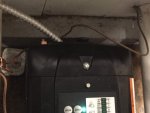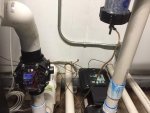Pemolis, forgive me if I'm being obtuse, but didn't the installer(s) bond the equipment at the time of install? Or did you self-install the swg and are now looking to connect it to the rest of your equipment because you didn't do that at the time of installation?
If you self-installed and did not bond, please take seriously the risk of stray current and remedy promptly.
To your original question...I use an inline zinc anode that is plumbed en route as the water flows into my heater. It has a bonding wire that is attached to the equipment bonding wire.
Many reputable members here believe that anodes-as-executed in the pool world are nothing more than a panacea, which may well be the case. One of the issues is the size of anode to surface and the pathway. Other issues come from differences in the way anode protection is used industrially for steel structures where it is blurred in moist soil.
If you refer to HVAC and marine knowledge on galvanic corrosion and methods, you begin to see where an inline anode connected to the bonding grid and located near the most vulnerable/valuable metal (heat exchanger) then pool anodes may begin to theoretically make sense.
All I know for sure is that the zinc DOES corrode. What I don't know is whether something else less noble would be corroding instead were it not there. Eg. My heat exchanger. If you're going to use an anode, I would suggest that the highest likelihood of it protecting a heater is to plumb it inline close to the heater and attach to the bonding grid.
In a perfect world, heat exchangers in a swg would be made of titanium since the swg plate is made of titanium and that way the exchanger would not be less noble on the galvanic scale. The industry has actually come out with same this year, hopefully based on real data not just a marketing ploy...but of course, the jury is out on that too

Just so you know, because you mentioned your hot water heater, THAT anode is magnesium, which is only recommended for freshwater -- it would corrode too quickly in brine/saltwater. Marine aluminum anodes are equally unsuited for pools, according to the literature. Which leaves you with zinc.
Zinc, in my tentative opinion, can combine with other materials to scale in certain conditions involving sequestrants, flow, high heat etc., but otherwise does not (again in my limited experience, which is kinda complicated) stain.



